Christian Bailey and Julie Kremer stand outside a temporary refrigerator unit in a hot field on June 26, 2020. Nothing about Christian’s appearance hints at the thousand or so miles he has just driven from Georgia to deliver mixed greens and other produce to Massachusetts. Christian wears a fluorescent work vest, a grey t-shirt, and new flaming red Air Jordans that squeak when he walks. Julie, a middle-aged woman with a Boston Strong facemask and blue work gloves has her hand placed firmly on her side, her “Food Link” shirt bunching at her touch. Julie and Christian are completing a delivery arranged by The Farmlink Project of 10,450 pounds of mixed greens from Plainville Farms in Hadley to four food bank locations across the state: Food Link in Waltham and Medford, Mystic Community Market in Medford, and Bread & Roses in Lawrence.
Julie started Food Link, a Boston-based nonprofit organization, eight years ago with Anne Dupont when Julie encountered food waste first-hand while volunteering at a fundraiser for her daughter’s school. She realized that the extra bread the school reserved from Panera usually went to waste at the end of the day. What began with a simple bread donation has now flourished into a thousand-pound delivery service to food banks and distributors throughout the Greater Boston area.
Christian and Julie, although they met just moments ago, are engaged in a heated political discussion. Christian has always been interested in politics: “Politics, history and religion. These are the three things that matter to me.” Christian and Julie disagree on the subject—the contention obvious—but they soon decide to continue to the next drop-off point on the delivery. When they shift away from each other, both of their bodies tilting outward, Julie hands Christian a full jug of orange juice. “Take this, you must be thirsty.”
Christian accepted the juice, the large bottle perspiring in his glove-clad palm. “Thanks.” He smiles, takes a sip, and walks towards his eighteen-wheel truck.
Christian Bailey has been a delivery driver for almost twenty years, making the same trek from Georgia to Massachusetts weekly. He leaves every Tuesday and returns home every Saturday. He covers this long expanse of land in fourteen hour segments: eleven to drive and three to rest. “The government made a rule and everyone has to follow.” Legally, he wants to cover 600 miles a day, so he has to be strategic. “Where you’re gonna park, where you’re gonna eat, where you’re gonna go to the restroom. You have to think about it all.” While he drives, he listens to political podcasts, inspirational videos on youtube, and even educational lessons on economics and finance. “They teach me how to save money and not get ripped off by nobody.”
Christian came to America from Jamaica twenty years ago with the intention of, like many immigrants, finding a better life. When he first arrived, he intended to “be in an election” and engage with the political sector in America, but when the opportunity arose to drive a truck, he took the job. “As a result of that, here I am.” Christian had a self-assured way of speaking; he told the facts and told them well. “You got to take the chances you got.” He steps up into the driver’s seat of the monstrous vehicle and leans out the window.
“Tufts University?” He hollers.
“Yep!” Julie calls back.
“See ya there!”
Julie and Christian meet at the next drop-off location on this delivery—Food Link’s other temporary set-up at Tufts University. Before the COVID-19 pandemic, Food Link collected and distributed about 45,000 pounds of produce a month. Since the pandemic, they have taken in an additional 225,000 pounds and opened temporary storage locations throughout Boston. Tufts and other organizations have donated refrigeration space, volunteers, and cars to help Julie and others with their mission to feed individuals deemed food insecure by the backlash of the pandemic. “Without that walk-in freezer space and without the inside cooler space, we couldn’t do what we’re doing,” said Julie.

At Tufts, Christian, Julie, and four other volunteers—Emma from Food Link, John from The Salvation Army, one other Farmlink Project team member, Rebecca Isaacson, and myself —work together to unload eight pallets of mixed greens into the Tufts kitchen space. Usually, Christian explains, the deliveries are seamless: he drives up to the entrance, they place a metal dock between the truck and the curb, and someone pulls the produce out on a vehicle. “I don’t usually help out with the unloading. Usually it’s easy. I’m out in five minutes.” At Tufts, however, the difference in height between the truck and the curb makes a simple delivery impossible. All of the boxes have to be unloaded by hand. It was a sticky day; the type of day where your shirt clings to your skin before you even step outside. We work together for over an hour, passing each other boxes and loading up the Tufts kitchen until not even one shelf in the three refrigerators remains empty.
When we reach the final drop-off location, Mystic Community Market, the sun has fallen beneath the tree line and Christian’s pristine red shoes are now covered in a thin layer of grey dust. Julie has stayed late to help Mystic Community Market unload the final boxes of produce.
“My favorite thing about driving is the people.” Christian tells me. He waves his arm out the back of the truck in the direction of Julie and the other volunteers at Mystic Community Market. “You get to see all different walks of life.”
He nods, as if confirming his belief. “Yep. People, persons, individuals—that’s what I love.” He takes another box of mixed greens off the tall stack in the car and hands it to me. A bag of lettuce pokes out from the cardboard lip.
“No matter where you go, the practical is all the same; people set up the same metal docks, drive the same forklifts, deliver the same boxes. The communication—the calls and the texting and the coordination—all the same.” Wiping a bead of sweat off his forehead, Christian hops off the side of the truck onto the pavement. The metal cart, stacked high with boxes, shudders in the gust of air. He grabs the handle with one of his calloused palms and uses the other to straighten out the tower of lettuce.
Julie, standing in the doorframe, rushes over to help him. “You get to see what a lot of people feel about different things. The opinions differ in every state, but people share a commonality. A common goal. We all are giving food to people who need food.” Julie grabs the other end of the cart while Christian speaks. “And to me, that feels like a good deed accomplished.”
Together, Christian and Julie wheel the cart towards the curb next to the food bank. They look at each other, nod, and both raise the cart at the same time. Not a single box falls.
< Back
Christian Bailey and Julie Kremer stand outside a temporary refrigerator unit in a hot field on June 26, 2020. Nothing about Christian’s appearance hints at the thousand or so miles he has just driven from Georgia to deliver mixed greens and other produce to Massachusetts. Christian wears a fluorescent work vest, a grey t-shirt, and new flaming red Air Jordans that squeak when he walks. Julie, a middle-aged woman with a Boston Strong facemask and blue work gloves has her hand placed firmly on her side, her “Food Link” shirt bunching at her touch. Julie and Christian are completing a delivery arranged by The Farmlink Project of 10,450 pounds of mixed greens from Plainville Farms in Hadley to four food bank locations across the state: Food Link in Waltham and Medford, Mystic Community Market in Medford, and Bread & Roses in Lawrence.
Julie started Food Link, a Boston-based nonprofit organization, eight years ago with Anne Dupont when Julie encountered food waste first-hand while volunteering at a fundraiser for her daughter’s school. She realized that the extra bread the school reserved from Panera usually went to waste at the end of the day. What began with a simple bread donation has now flourished into a thousand-pound delivery service to food banks and distributors throughout the Greater Boston area.
Christian and Julie, although they met just moments ago, are engaged in a heated political discussion. Christian has always been interested in politics: “Politics, history and religion. These are the three things that matter to me.” Christian and Julie disagree on the subject—the contention obvious—but they soon decide to continue to the next drop-off point on the delivery. When they shift away from each other, both of their bodies tilting outward, Julie hands Christian a full jug of orange juice. “Take this, you must be thirsty.”
Christian accepted the juice, the large bottle perspiring in his glove-clad palm. “Thanks.” He smiles, takes a sip, and walks towards his eighteen-wheel truck.
Christian Bailey has been a delivery driver for almost twenty years, making the same trek from Georgia to Massachusetts weekly. He leaves every Tuesday and returns home every Saturday. He covers this long expanse of land in fourteen hour segments: eleven to drive and three to rest. “The government made a rule and everyone has to follow.” Legally, he wants to cover 600 miles a day, so he has to be strategic. “Where you’re gonna park, where you’re gonna eat, where you’re gonna go to the restroom. You have to think about it all.” While he drives, he listens to political podcasts, inspirational videos on youtube, and even educational lessons on economics and finance. “They teach me how to save money and not get ripped off by nobody.”
Christian came to America from Jamaica twenty years ago with the intention of, like many immigrants, finding a better life. When he first arrived, he intended to “be in an election” and engage with the political sector in America, but when the opportunity arose to drive a truck, he took the job. “As a result of that, here I am.” Christian had a self-assured way of speaking; he told the facts and told them well. “You got to take the chances you got.” He steps up into the driver’s seat of the monstrous vehicle and leans out the window.
“Tufts University?” He hollers.
“Yep!” Julie calls back.
“See ya there!”
Julie and Christian meet at the next drop-off location on this delivery—Food Link’s other temporary set-up at Tufts University. Before the COVID-19 pandemic, Food Link collected and distributed about 45,000 pounds of produce a month. Since the pandemic, they have taken in an additional 225,000 pounds and opened temporary storage locations throughout Boston. Tufts and other organizations have donated refrigeration space, volunteers, and cars to help Julie and others with their mission to feed individuals deemed food insecure by the backlash of the pandemic. “Without that walk-in freezer space and without the inside cooler space, we couldn’t do what we’re doing,” said Julie.

At Tufts, Christian, Julie, and four other volunteers—Emma from Food Link, John from The Salvation Army, one other Farmlink Project team member, Rebecca Isaacson, and myself —work together to unload eight pallets of mixed greens into the Tufts kitchen space. Usually, Christian explains, the deliveries are seamless: he drives up to the entrance, they place a metal dock between the truck and the curb, and someone pulls the produce out on a vehicle. “I don’t usually help out with the unloading. Usually it’s easy. I’m out in five minutes.” At Tufts, however, the difference in height between the truck and the curb makes a simple delivery impossible. All of the boxes have to be unloaded by hand. It was a sticky day; the type of day where your shirt clings to your skin before you even step outside. We work together for over an hour, passing each other boxes and loading up the Tufts kitchen until not even one shelf in the three refrigerators remains empty.
When we reach the final drop-off location, Mystic Community Market, the sun has fallen beneath the tree line and Christian’s pristine red shoes are now covered in a thin layer of grey dust. Julie has stayed late to help Mystic Community Market unload the final boxes of produce.
“My favorite thing about driving is the people.” Christian tells me. He waves his arm out the back of the truck in the direction of Julie and the other volunteers at Mystic Community Market. “You get to see all different walks of life.”
He nods, as if confirming his belief. “Yep. People, persons, individuals—that’s what I love.” He takes another box of mixed greens off the tall stack in the car and hands it to me. A bag of lettuce pokes out from the cardboard lip.
“No matter where you go, the practical is all the same; people set up the same metal docks, drive the same forklifts, deliver the same boxes. The communication—the calls and the texting and the coordination—all the same.” Wiping a bead of sweat off his forehead, Christian hops off the side of the truck onto the pavement. The metal cart, stacked high with boxes, shudders in the gust of air. He grabs the handle with one of his calloused palms and uses the other to straighten out the tower of lettuce.
Julie, standing in the doorframe, rushes over to help him. “You get to see what a lot of people feel about different things. The opinions differ in every state, but people share a commonality. A common goal. We all are giving food to people who need food.” Julie grabs the other end of the cart while Christian speaks. “And to me, that feels like a good deed accomplished.”
Together, Christian and Julie wheel the cart towards the curb next to the food bank. They look at each other, nod, and both raise the cart at the same time. Not a single box falls.
Christian Bailey and Julie Burke
Truck Driver & Food Bank Founder
Christian Bailey and Julie Kremer stand outside a temporary refrigerator unit in a hot field on June 26, 2020. Nothing about Christian’s appearance hints at the thousand or so miles he has just driven from Georgia to deliver mixed greens and other produce to Massachusetts. Christian wears a fluorescent work vest, a grey t-shirt, and new flaming red Air Jordans that squeak when he walks. Julie, a middle-aged woman with a Boston Strong facemask and blue work gloves has her hand placed firmly on her side, her “Food Link” shirt bunching at her touch. Julie and Christian are completing a delivery arranged by The Farmlink Project of 10,450 pounds of mixed greens from Plainville Farms in Hadley to four food bank locations across the state: Food Link in Waltham and Medford, Mystic Community Market in Medford, and Bread & Roses in Lawrence.
Julie started Food Link, a Boston-based nonprofit organization, eight years ago with Anne Dupont when Julie encountered food waste first-hand while volunteering at a fundraiser for her daughter’s school. She realized that the extra bread the school reserved from Panera usually went to waste at the end of the day. What began with a simple bread donation has now flourished into a thousand-pound delivery service to food banks and distributors throughout the Greater Boston area.
Christian and Julie, although they met just moments ago, are engaged in a heated political discussion. Christian has always been interested in politics: “Politics, history and religion. These are the three things that matter to me.” Christian and Julie disagree on the subject—the contention obvious—but they soon decide to continue to the next drop-off point on the delivery. When they shift away from each other, both of their bodies tilting outward, Julie hands Christian a full jug of orange juice. “Take this, you must be thirsty.”
Christian accepted the juice, the large bottle perspiring in his glove-clad palm. “Thanks.” He smiles, takes a sip, and walks towards his eighteen-wheel truck.
Christian Bailey has been a delivery driver for almost twenty years, making the same trek from Georgia to Massachusetts weekly. He leaves every Tuesday and returns home every Saturday. He covers this long expanse of land in fourteen hour segments: eleven to drive and three to rest. “The government made a rule and everyone has to follow.” Legally, he wants to cover 600 miles a day, so he has to be strategic. “Where you’re gonna park, where you’re gonna eat, where you’re gonna go to the restroom. You have to think about it all.” While he drives, he listens to political podcasts, inspirational videos on youtube, and even educational lessons on economics and finance. “They teach me how to save money and not get ripped off by nobody.”
Christian came to America from Jamaica twenty years ago with the intention of, like many immigrants, finding a better life. When he first arrived, he intended to “be in an election” and engage with the political sector in America, but when the opportunity arose to drive a truck, he took the job. “As a result of that, here I am.” Christian had a self-assured way of speaking; he told the facts and told them well. “You got to take the chances you got.” He steps up into the driver’s seat of the monstrous vehicle and leans out the window.
“Tufts University?” He hollers.
“Yep!” Julie calls back.
“See ya there!”
Julie and Christian meet at the next drop-off location on this delivery—Food Link’s other temporary set-up at Tufts University. Before the COVID-19 pandemic, Food Link collected and distributed about 45,000 pounds of produce a month. Since the pandemic, they have taken in an additional 225,000 pounds and opened temporary storage locations throughout Boston. Tufts and other organizations have donated refrigeration space, volunteers, and cars to help Julie and others with their mission to feed individuals deemed food insecure by the backlash of the pandemic. “Without that walk-in freezer space and without the inside cooler space, we couldn’t do what we’re doing,” said Julie.

At Tufts, Christian, Julie, and four other volunteers—Emma from Food Link, John from The Salvation Army, one other Farmlink Project team member, Rebecca Isaacson, and myself —work together to unload eight pallets of mixed greens into the Tufts kitchen space. Usually, Christian explains, the deliveries are seamless: he drives up to the entrance, they place a metal dock between the truck and the curb, and someone pulls the produce out on a vehicle. “I don’t usually help out with the unloading. Usually it’s easy. I’m out in five minutes.” At Tufts, however, the difference in height between the truck and the curb makes a simple delivery impossible. All of the boxes have to be unloaded by hand. It was a sticky day; the type of day where your shirt clings to your skin before you even step outside. We work together for over an hour, passing each other boxes and loading up the Tufts kitchen until not even one shelf in the three refrigerators remains empty.
When we reach the final drop-off location, Mystic Community Market, the sun has fallen beneath the tree line and Christian’s pristine red shoes are now covered in a thin layer of grey dust. Julie has stayed late to help Mystic Community Market unload the final boxes of produce.
“My favorite thing about driving is the people.” Christian tells me. He waves his arm out the back of the truck in the direction of Julie and the other volunteers at Mystic Community Market. “You get to see all different walks of life.”
He nods, as if confirming his belief. “Yep. People, persons, individuals—that’s what I love.” He takes another box of mixed greens off the tall stack in the car and hands it to me. A bag of lettuce pokes out from the cardboard lip.
“No matter where you go, the practical is all the same; people set up the same metal docks, drive the same forklifts, deliver the same boxes. The communication—the calls and the texting and the coordination—all the same.” Wiping a bead of sweat off his forehead, Christian hops off the side of the truck onto the pavement. The metal cart, stacked high with boxes, shudders in the gust of air. He grabs the handle with one of his calloused palms and uses the other to straighten out the tower of lettuce.
Julie, standing in the doorframe, rushes over to help him. “You get to see what a lot of people feel about different things. The opinions differ in every state, but people share a commonality. A common goal. We all are giving food to people who need food.” Julie grabs the other end of the cart while Christian speaks. “And to me, that feels like a good deed accomplished.”
Together, Christian and Julie wheel the cart towards the curb next to the food bank. They look at each other, nod, and both raise the cart at the same time. Not a single box falls.
.png)

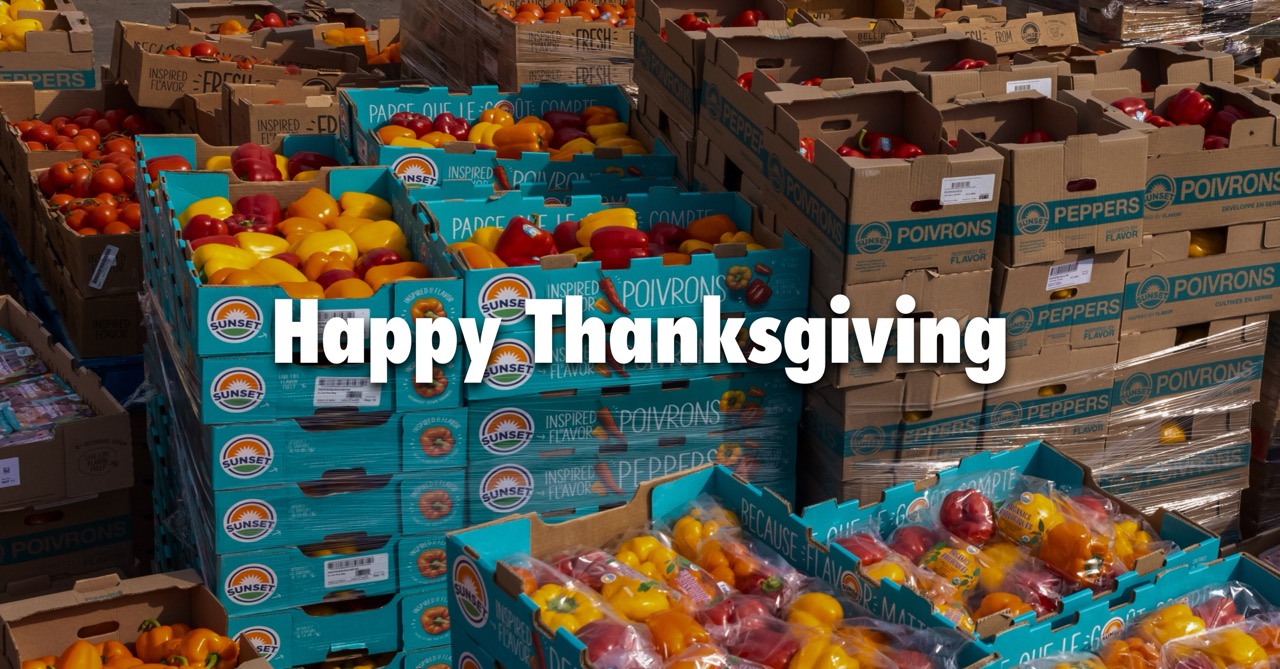
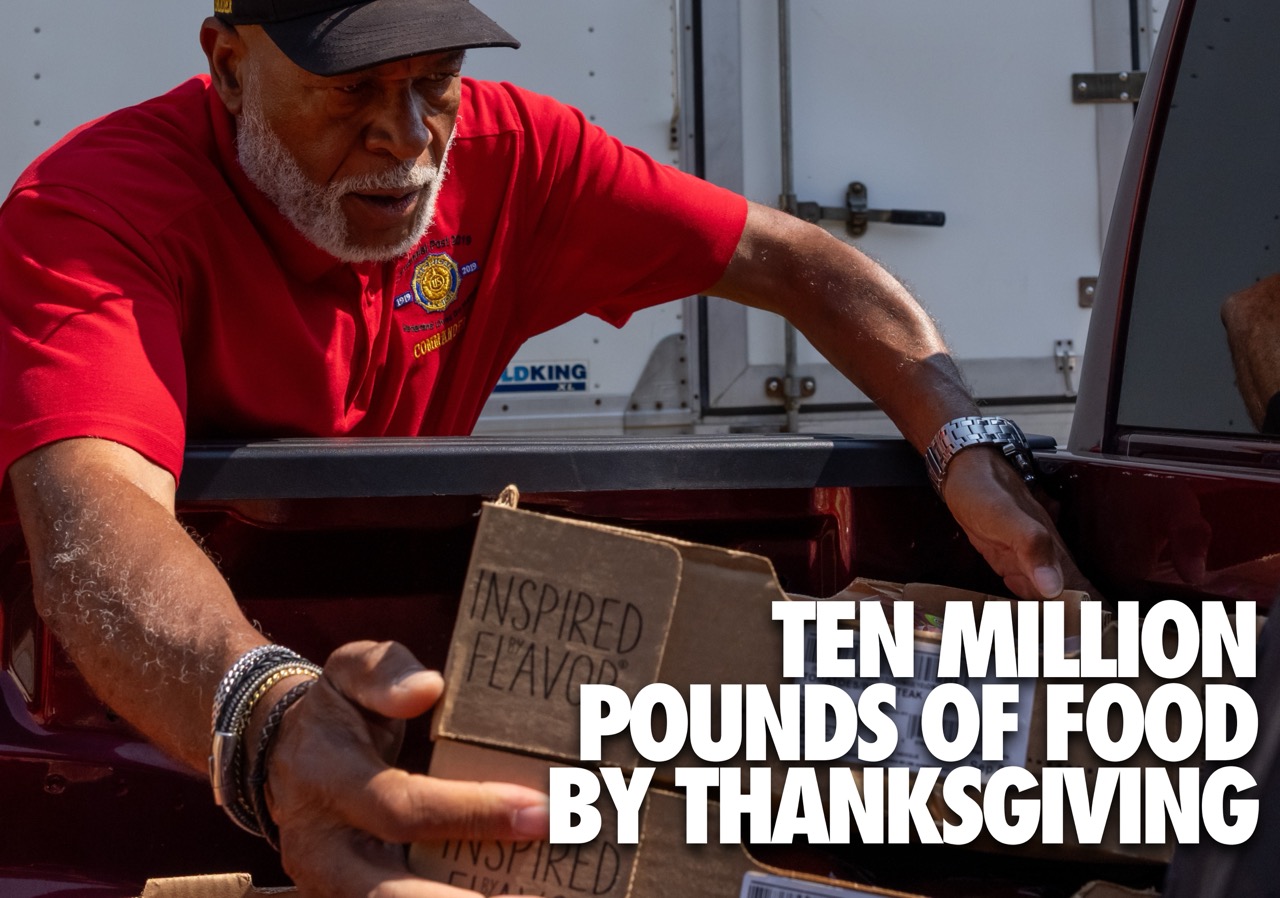
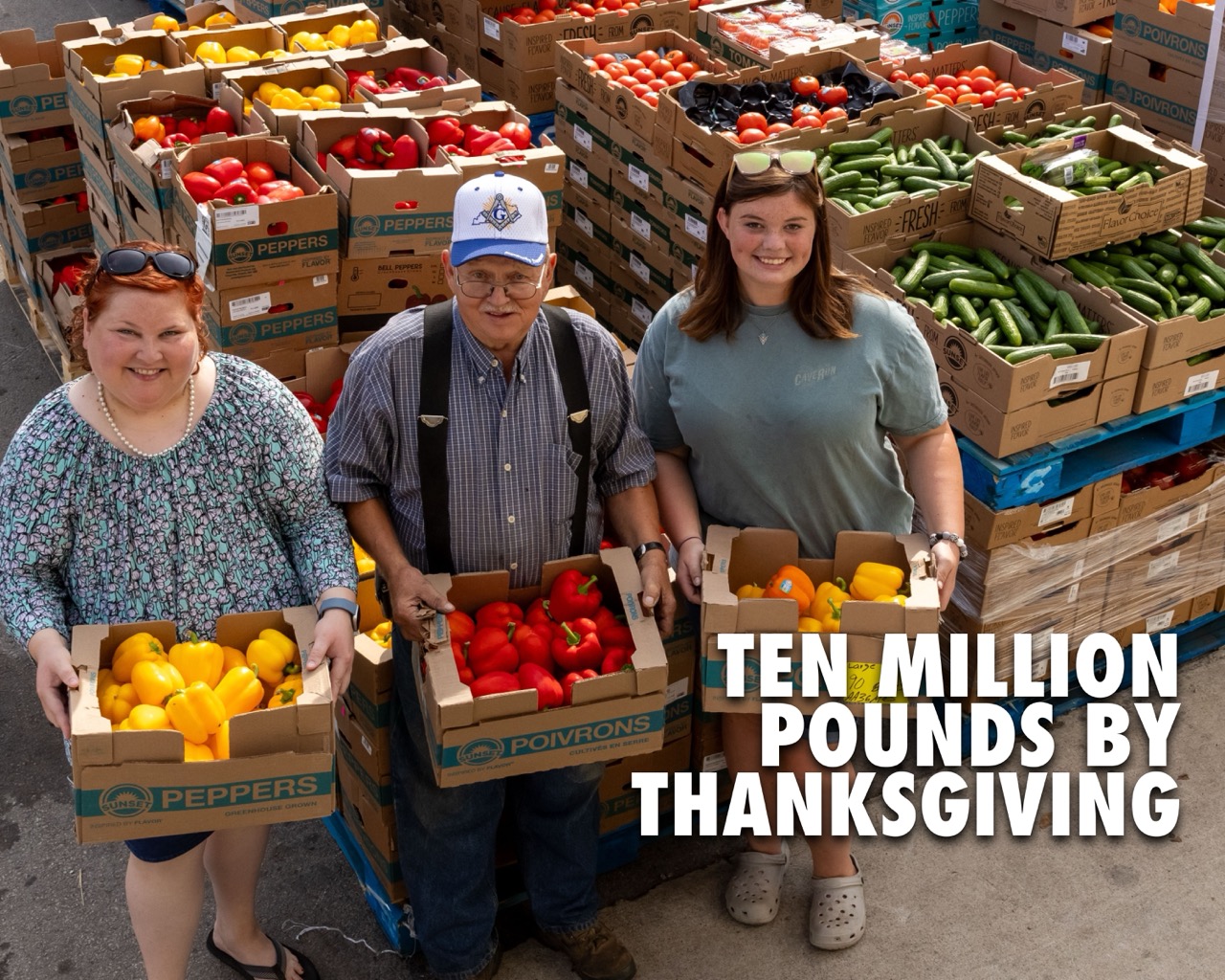
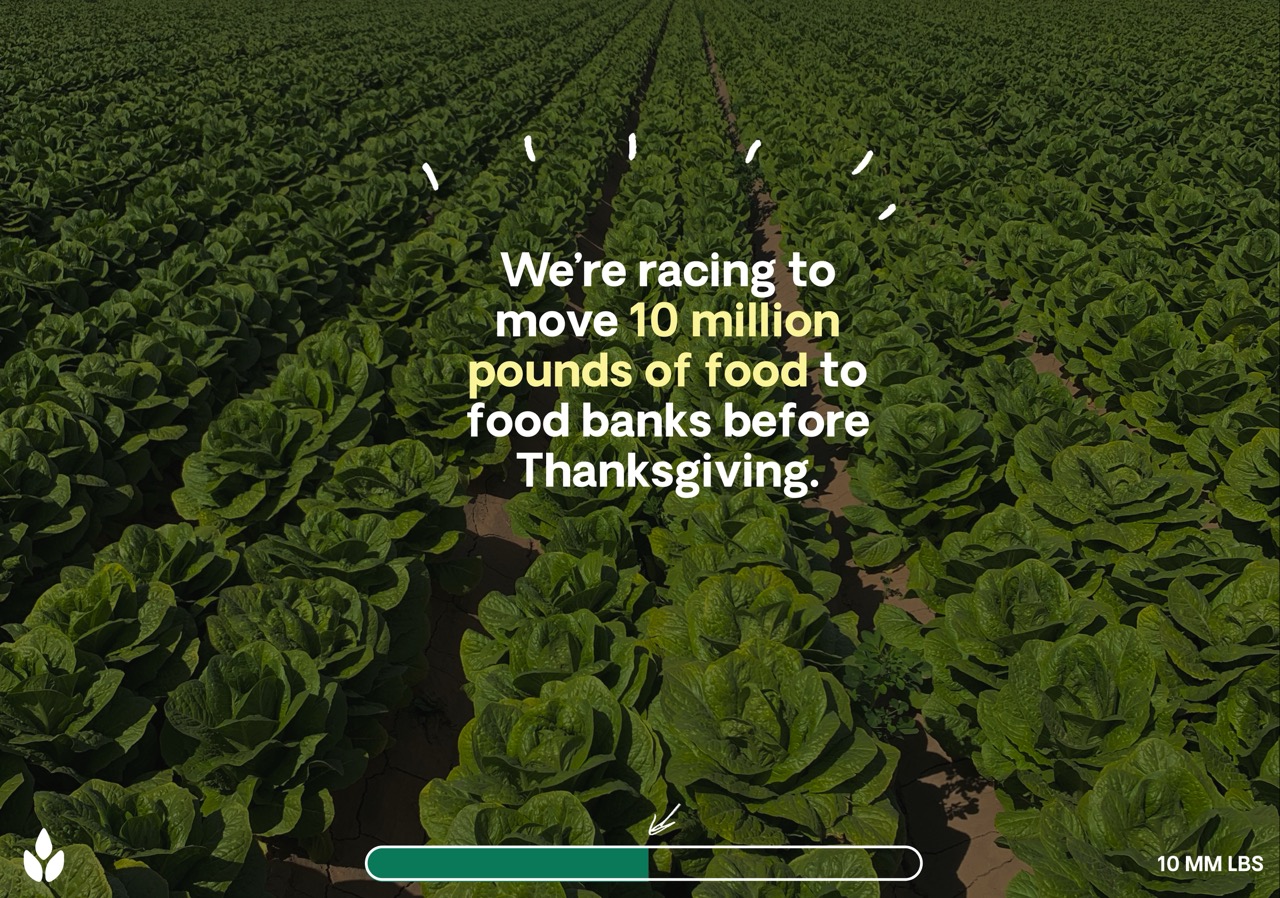
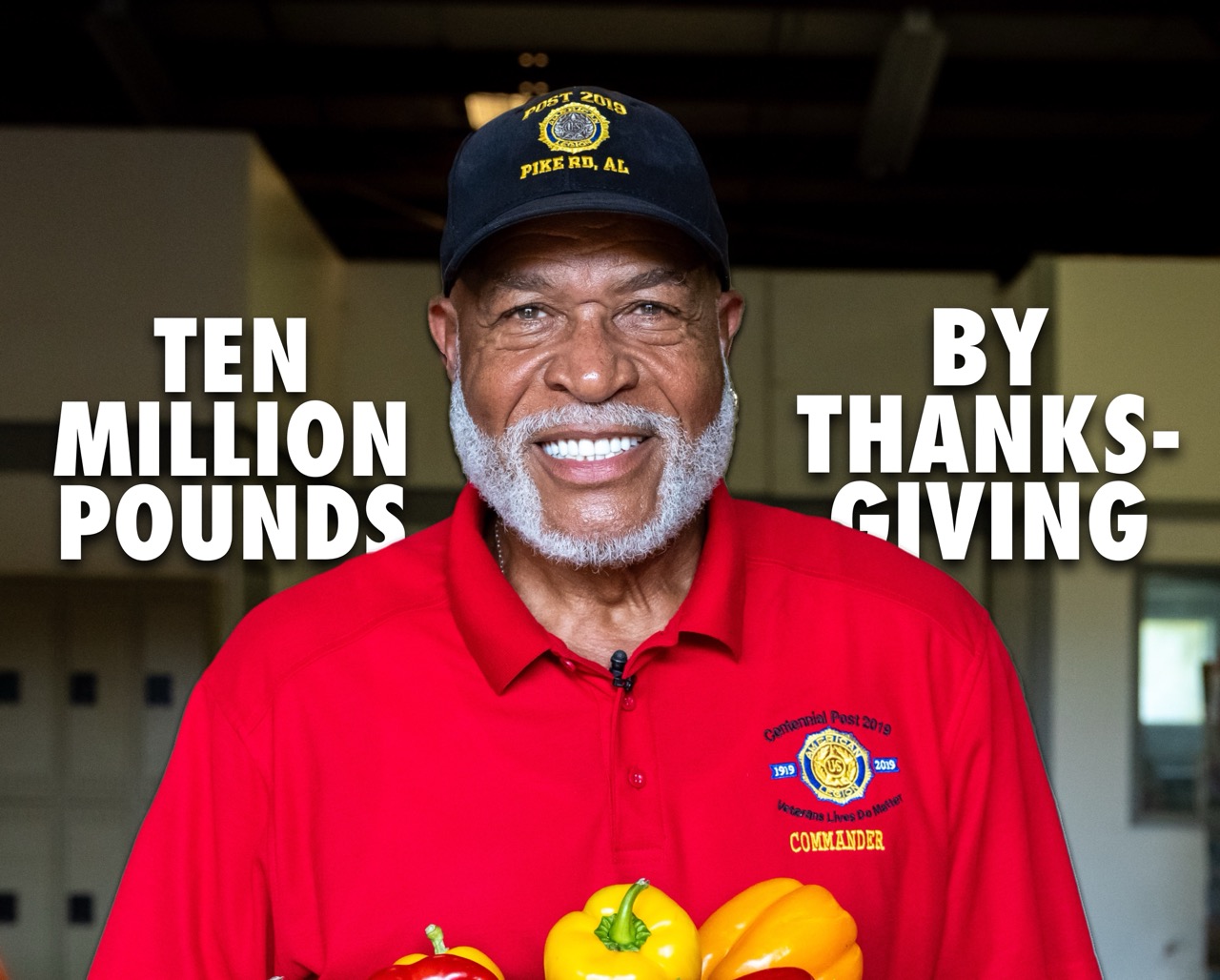
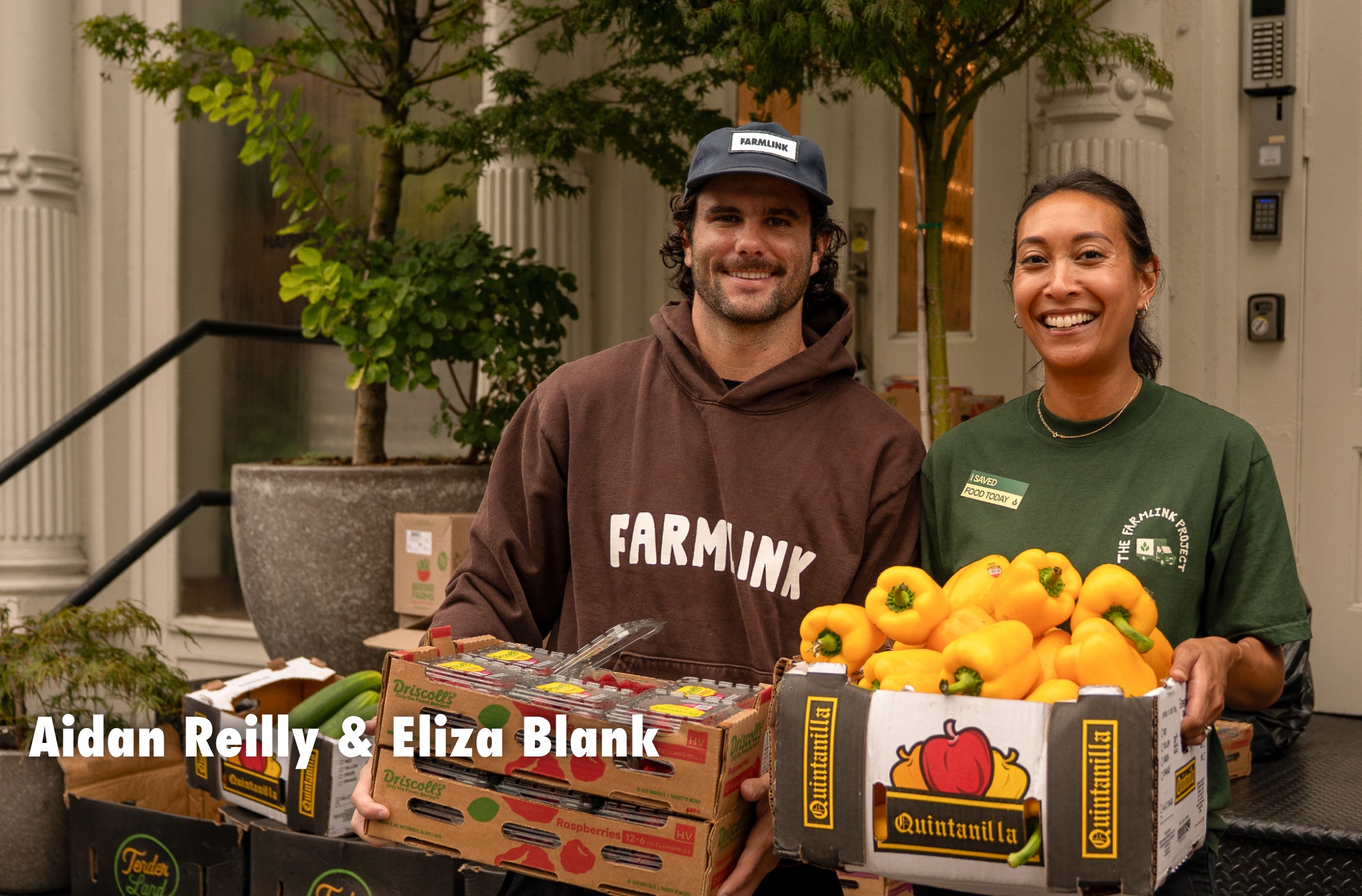
.svg)
.svg)
.svg)